Delving deep into the realm of fermented foods and exploring the world of probiotics can have a profound impact on your overall health. Probiotics offer a wide range of benefits, including improvements in digestive, cardiovascular, immune, mental, metabolic, and skin health. The extensive research backing the efficacy of probiotics makes it a worthwhile addition to your wellness routine.
Before incorporating probiotics into your daily regimen, it’s essential to understand the ins and outs of these beneficial microorganisms. From determining whether you should take probiotics to evaluating their effectiveness, it’s crucial to grasp the fundamentals of probiotic supplementation.
So, what exactly are probiotics? According to the International Scientific Association for Probiotics and Prebiotics, probiotics are live microorganisms that, when consumed in adequate amounts, confer health benefits on the host. These friendly bacteria play a vital role in maintaining a healthy balance in the gut microbiome.
When it comes to probiotics, it’s essential to consider not only the probiotic strains but also prebiotics and synbiotics. Prebiotics serve as food for the beneficial bacteria in your gut, promoting their growth and proliferation. On the other hand, synbiotics combine probiotics and prebiotics in a single product, offering a comprehensive approach to gut health.
Understanding the nomenclature of probiotics is crucial for selecting the right strains. Each probiotic is classified by its genus, species, and strain, highlighting the specific benefits it offers. By deciphering the probiotic names, you can make informed choices about which strains are best suited to your health goals.
The Health Benefits of Probiotics
Probiotics, such as Lactobacillus and Bifidobacterium, are renowned for their diverse health benefits. Lactobacillus strains, including acidophilus, have been associated with improved immune, gut, digestive, and vaginal health. Additionally, various Lactobacillus strains have shown efficacy in managing conditions like atopic dermatitis, diarrhea, hypercholesterolemia, and obesity.
Similarly, Bifidobacterium species play a crucial role in digesting fiber and complex carbohydrates, supporting cardiovascular health, digestive health, weight management, and immune function. These beneficial bacteria have been linked to alleviating symptoms of irritable bowel syndrome, reducing inflammation, and improving psychological well-being.
While fermented foods undergo a similar process to probiotics, they may not always meet the criteria for true probiotics. Although fermented foods contain live microorganisms that benefit the microbiota, they may not provide the specific strains or quantities required for probiotic efficacy.
Navigating Probiotic Supplements
Probiotic supplements offer a convenient way to reap the benefits of probiotics. With potential advantages for digestive, skin, and heart health, probiotic supplements have garnered attention for their disease-preventive properties. When selecting a probiotic supplement, consider factors such as the purpose, bacterial strains, dosage, frequency of use, and any contraindications.
Choosing the Right Probiotic
Collaborating with a Registered Dietitian or healthcare provider can help you identify the most suitable probiotic for your needs. Seed’s Daily Synbiotic, a probiotic-prebiotic blend, has garnered praise for its support of digestive, cardiovascular, and dermatological health. With a patented delivery system and unique probiotic strains, Seed’s Daily Synbiotic offers a comprehensive approach to gut health.
Dispelling Common Probiotic Myths
As probiotics gain popularity, misconceptions and myths abound. One prevalent myth is that a higher dosage equates to better results. However, probiotics do not need to colonize the gut to be effective, emphasizing the importance of consistent daily intake for optimal benefits.
Contrary to the belief that probiotics only benefit digestion, these beneficial bacteria offer a myriad of health advantages, ranging from improved skin health to enhanced cardiovascular function.
Unlocking a Positive Relationship with Food
Stress and obsession over food can hinder your well-being. By cultivating a positive relationship with food, you can embark on a journey towards balanced eating and improved overall health. Sign up for a free masterclass to discover the key habits that can transform your relationship with food and liberate you from dieting and food fixation.
Connect with Us
Share your experiences with probiotics and join the conversation on Instagram. Follow us at @nutritionstrippederica and @nutritionstripped to stay updated on the latest insights and trends in nutrition. Explore Seed’s Instagram for daily updates and valuable information on gut health.
This article is sponsored by Seed, a brand renowned for its quality probiotic products. All opinions expressed are our own, and we adhere to FTC guidelines for transparency and integrity.

